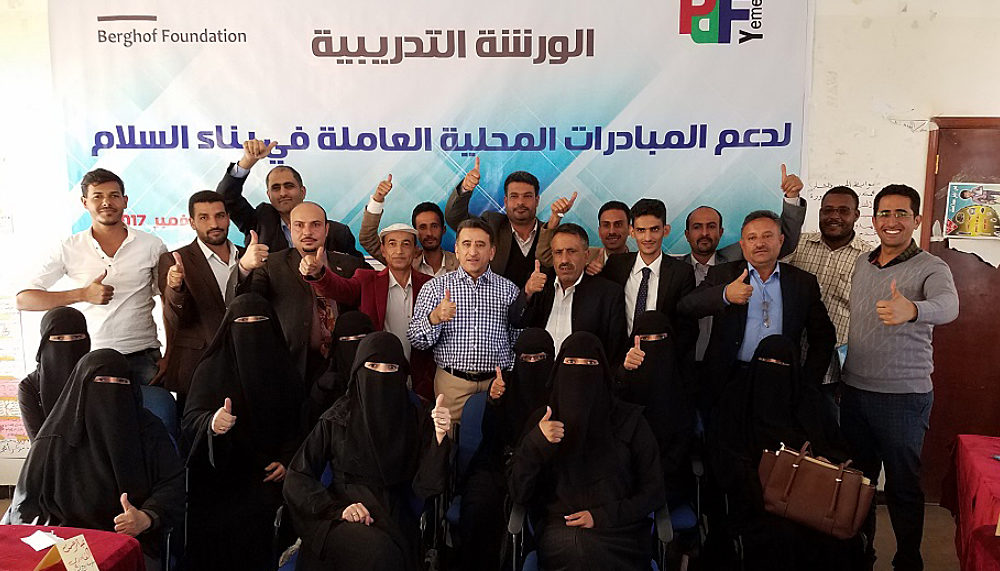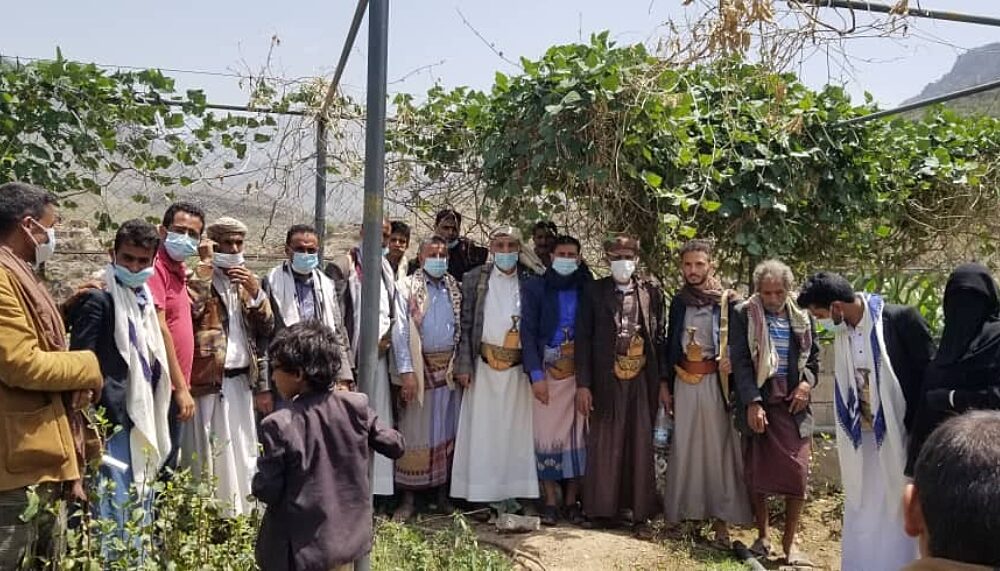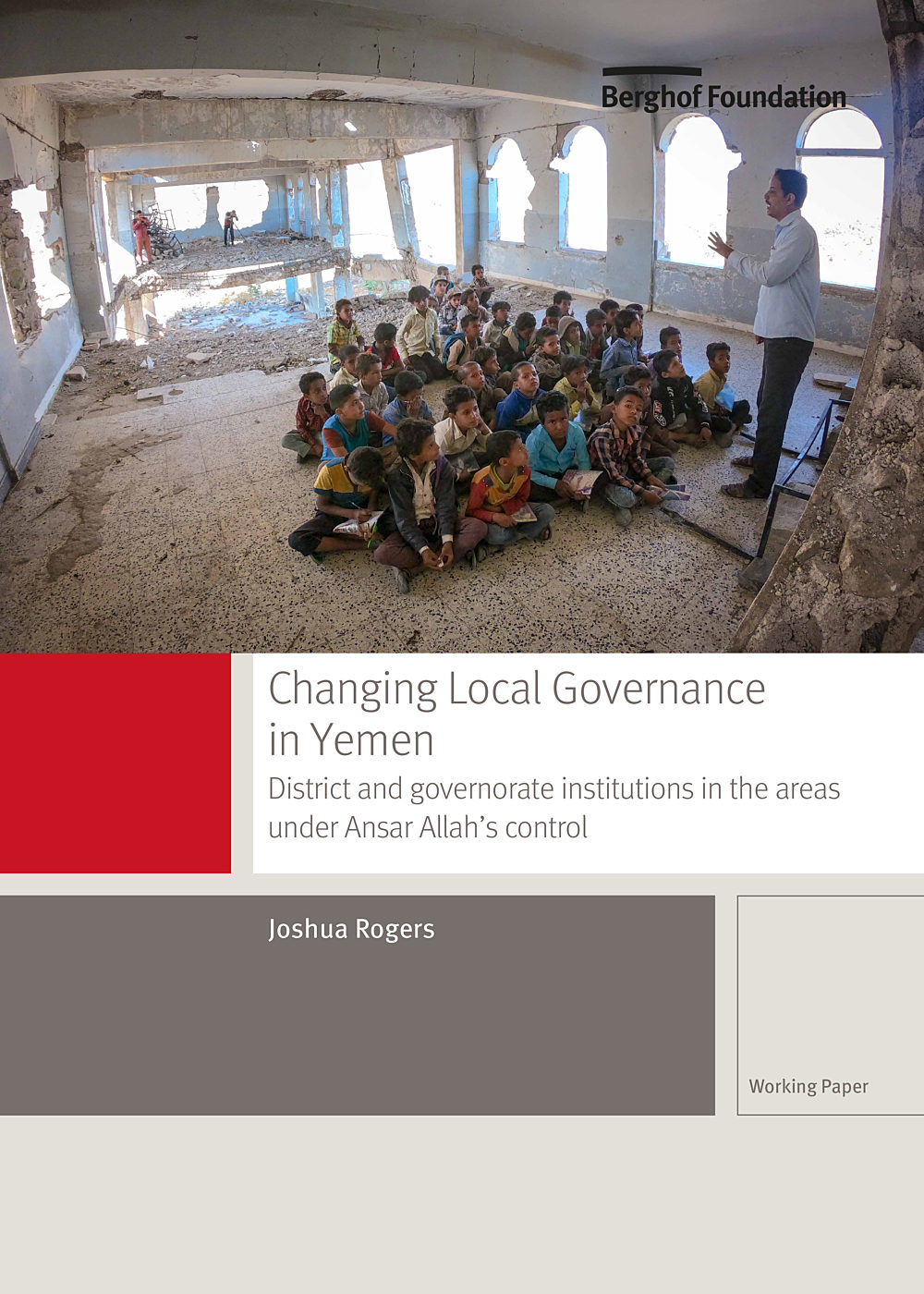BLOG POST | 29 Jun 2021
Seven lessons for inclusive local governance and peacebuilding in Yemen
International support to local governance

These emerging lessons can help inform Yemeni policy makers thinking about local governance and international actors looking to mitigate the impact of conflict.
By Katharina Jautz, Joshua Rogers
The Berghof Foundation and the Political Development Forum Yemen (PDF) have been working to address drivers of conflict at the governorate and district level in Yemen since 2017. Our work centres on supporting inclusive consultative committees that ensure a wide range of voices are heard in governorate-level decision-making, engage in mediation initiatives, and work to strengthen cooperation between local authorities and local civil society. These committees are currently active in Dhamar, Hadhramawt and al-Mahra, with an expansion of the model planned to Amran.
Support to the consultative committees is financed through the project ‘Strengthening inclusive local governance and peacebuilding in Yemen,’ which is implemented in close cooperation with a GIZ sister project that works with district-level authorities and the consultative committees to identify and implement urgent small infrastructure and service delivery projects. Both are financed by the German Federal Foreign Office.

The projects together were designed to pilot approaches to working with and complementing existing governorate- and district-level institutions in Yemen. They have been successful in safeguarding local state capacity, supporting delivery of urgently needed services without recourse to parallel structures, strengthening local capacities for conflict mediation, fostering local dialogue, and encouraging more inclusive decision-making.
In light of the positive impacts and dynamics emerging around the consultative committees, this article documents emerging lessons from the pilot project that can help inform Yemeni policy makers thinking about local governance issues and international actors looking to mitigate the impact of conflict and lay the foundations for peace. Few of these lessons will be surprising to practitioners who have engaged with the discussions on local governance and peacebuilding in conflict-affected contexts of the past decade. Yet, they bear repeating and highlighting in this specific context, where international actors risk repeating past mistakes.
1. Talk the talk – and walk the walk
In Yemen, there remains an urgent need for political discussion, dialogue, and exchange between different groups and parties. From a peacebuilding perspective, creating space for dialogue is essential for finding negotiated solutions and avoiding the entanglement of local disagreements with national-level violent conflict. From a local governance perspective, local dialogue supports social cohesion and can improve the responsiveness of local governance. Yet, while fora need to be created and maintained in order to be ready when opportunities arise, dialogue for dialogue’s sake is a recipe for frustration.
Dialogue for dialogue’s sake is a recipe for frustration
Dialogue formats that have aims beyond the talking and that offer participants concrete possibilities for action allow a focus on concrete problems and locally generated solutions. By focusing on issues of shared local concern, the project has supported local actors to bridge, rather than reinforce, conflict divides.
2. Work with the grain – and insist on inclusivity
The project was designed to complement and facilitate the work of existing formal and informal local governance structures. Consultative committees were drawn from local authorities, tribal structures, and civil society to facilitate discussions and information exchange between them. Criteria for committee membership insisted on diversity in gender, age, and political affiliation, within a constructive framework that took a close mapping of the de facto distribution of power as its starting point. The pilot project succeeded in including politically marginalised and sensitive voices: it insisted on women’s participation and the inclusion of geographically marginalised areas, but also on inclusivity across conflict divides, working for instance with figures close to the Islah party in Houthi-controlled Dhamar and bridging divides between the coastal and central regions and different political currents in Hadhramawt.
Since the committees’ formation, successes of female mediators in conflict resolution, of youth initiatives in local peace-making, and the ability of these politically and geographically diverse bodies to provide effective consultation, have convinced formerly reluctant stakeholders of the value of inclusivity.
3. Work at multiple levels
Building capacity at the district level and developing district initiatives can be successful only if supported administratively and politically at the governorate level. Conversely, without district-level capacity to implement projects and interface with communities, governorate-level administration has little impact on the ground. Similarly, mediation supported at the governorate level can help resolve local disputes where more local mediators may be perceived as partial or unable to provide the needed guarantees; while resolving festering community-level conflict provides an avenue to unblock basic service provision, rebuild trust in governorate and district institutions, and help avoid local entanglements with the larger, national-level, political conflict.
In the longer term, effective local governance will need an enabling central environment, political will, and commitment at the governorate level as well as capacity for service delivery and effective administration in the districts.
4. Support dormant capacities
There is dormant capacity in local governance systems. Despite salaries paid irregularly in small fractions of their pre-war levels in areas under control of Ansar Allah, and an absence of investment budgets and planning permission throughout the country, officials at the district and governorate levels want to do their job and largely remain in place: pre-war payrolls have only changed marginally. By providing funding for investment and working closely with the local officials in place, the project has supported this local capacity and spurred it into action.
Investments of as little as €2,000 can make an important contribution to local initiatives
5. Build capacity by doing – and remain adaptable
To support local capacity, the project has consistently followed an applied, learning-by-doing approach. The GIZ small projects work through and with local structures and give them real responsibility. This sometimes means accepting delays and not being in full control. Similarly, dialogue, deliberation, and mediation components were designed to allow organic growth – and to adapt to local needs and emerging possibilities. This requires flexibility from both implementers and donors. Foregrounding learning-by-doing has also allowed the project to concretely demonstrate the added value of inclusivity. For instance, by supporting the conflict mediation efforts of female members of the consultative committees and supporting women-led local peace initiatives, the project has showcased their crucial contributions to conflict transformation and peacebuilding.
6. Invest – small contributions can have big results
Adopting a flexible, locally led approach in an environment with dormant capacity and very limited capital has allowed the project to make a little go a long way. Investments of as little as €2,000 - 5,000 can make an important contribution to local initiatives and serve as an anchor to raise funds from communities, local businesses, and international donors, while encouraging local authorities to play their role as coordinators of different stakeholders, including international donors, at the local level. Initiatives supported by the project negotiated local ceasefires and prisoner exchanges, resolved ‘non-political’ local conflicts that allowed health centres and schools to re-open, restored access to water and roads, and ended long-running local cycles of conflict and revenge.
7. Take it to the next level
To support inclusive and effective local governance, working exclusively with and at the local level is not sufficient. Local structures are constrained by funding, authorisations, laws, bylaws, and practices over which they have little control. Building support for effective local governance with national actors and international stakeholders can help to foster an enabling environment for effective local governance. By fostering dialogue between local and national authorities, and by providing avenues for local concerns to inform the design and implementation of development interventions, the project has sought to bring local concerns, including over the distribution of resources, ‘to the next level.’

Project-supported dialogue has fostered cooperation between governorates on issues of shared concern, like disaster response planning between Hadhramawt and al-Mahra, and allowed governorates to share good practices. In addition, they identified recommendations for the short term endorsed at cabinet level, and identified visions for constructive central-local relations in post-war Yemen.
These seven lessons, though broadly applicable to the current situation in Yemen and beyond, must be paired with an acute sensitivity for the particularities of different governorates and their modes of working – differences that recent Berghof research suggests are growing. No blueprint for success, these lessons may suggest opportunities for enhancing inclusive and effective local governance and peacebuilding, based on approaches that have proven to work.
For more information on local governance in Yemen, please check out our Resource Hub and our Yemen publications.
These lessons were identified by Joshua Rogers and Katharina Jautz with input from Hasan Shujaa and Oliver Wils.
Media contact
You can reach the press team at:
+49 (0) 177 7052758
email hidden; JavaScript is required


